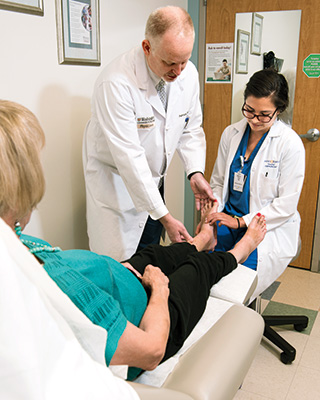Major clinical trials target arterial disease

Vascular surgeon Patrick Geraghty, MD, specializes in treating patients who have peripheral arterial disease (PAD) — blockage of the vessels that carry blood from the heart to the legs. But his reach extends well beyond his clinical practice in the St. Louis region; he also is a national leader in developing new PAD treatments.
“Tobacco use and diabetes are the two most significant drivers of PAD, which carries the risks of heart attack, stroke and the need for amputation,” says Geraghty, who treats patients at Barnes-Jewish Hospital. “PAD is most commonly seen in the elderly, but heavy smokers and diabetic patients may require intervention by their late 30s or 40s.”
The Centers for Disease Control and Prevention (CDC) estimates that 8.5 million people in the United States have PAD. As the population ages and diabetes becomes epidemic, these numbers are steadily increasing.
Geraghty began his practice in the early 2000s, when almost all stent devices used in the superficial femoral artery — the most common artery affected by PAD — were designed to treat other conditions. Working with manufacturers, Geraghty helped design clinical trials to test new devices created specifically for PAD. The VIBRANT trial, which he co-led, identified features that contributed to the devices’ limitations. The resulting redesigned version continues to be a mainstay of lower-extremity interventions.
Geraghty also worked with the Society for Vascular Surgery (SVS) Critical Limb Ischemia Workgroup to advise the Food and Drug Administration (FDA) regarding clinical trial design. The workgroup introduced objective performance goals that now allow companies to test some devices against historical data instead of using a control group, reducing cost and potentially speeding the introduction of new treatments.
Geraghty’s current focus is on disease of the small arteries below the knee, where PAD most severely affects diabetic patients. Among other research efforts, he helped design the nation’s first clinical trial of drug-coated angioplasty balloons for treatment of the distal arteries of the leg, and is the global co-principal investigator for that trial.
Geraghty describes running out of treatment options for patients as a “brutal” experience.
“Every amputation is a stimulus for wanting to do better. That has led me to devote much of my career to providing physicians with data they can use to select the best treatment for their patients.”
Highlights

JEFFREY JIM, MD, MPHS, trains other vascular specialists from around the country to perform transcarotid artery revascularization (TCAR), a minimally invasive procedure to open blocked carotid arteries in patients whose poor health or advanced age makes the traditional open surgery too risky. The two carotid arteries in the neck supply blood to the brain and can become blocked with plaque; if left untreated, blockages can stop blood flow, and plaque debris can dislodge to the brain, causing a potentially disabling stroke. In the procedure, surgeons deliver a stent directly into the carotid artery from a small incision in the neck — a safer and shorter route than delivering via the groin. Washington University was one of 25 institutions around the world to test TCAR, which is now FDA-approved.
A CLINICAL TRIAL at Washington University School of Medicine and two other U.S. centers is evaluating a branched endovascular graft for treating aneurysms and aortic dissections in the ascending aorta and aortic arch. Other stent devices — which also have been tested at Washington University — can be used in the aortic arch but have limited applicability.
THE FIVE-YEAR RESIDENCY program in vascular surgery graduated its first resident, John Ohman, MD, who has joined the faculty. The residency provides a shorter, more focused alternative to completing both a general surgery residency and vascular surgery fellowship. Graduating fellow Senthil Jayarajan, MD, MS, also joined the faculty and will offer expertise in analyzing quality and other healthcare data.